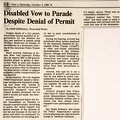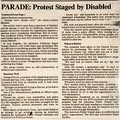Los Angeles Times 10/7/85
[This article continues on ADAPT 227 but the entire text of the story is included here for easier reading,]
3 photos by Rick Meyer/Los Angles Times: photo 1 is of a section of the march with men and women of various ethnic backgrounds and disabilities walking, rolling and pushing others' chairs. There is a sense of energy in the group and many wear buttons and carry signs reading "Access Now", "Restore 504", and "Our Time has Come -- CAPH."
Caption reads: Disabled move eastward down Wilshire Boulevard toward downtown in protest parade.
Photo 2 is another picture of the march, taken from above. The crowd is loosely organized, many in the front are looking up and smiling. There are children with disabilities, people in neckties, people with headbands. In the crowd you can see Bill Bolte, Bob Kafka, Gil Casarez among many others. Some carry signs on sticks reading "APTA oppresses", as well as "Transit for All" and one about ADAPT.
Caption reads: Signs are carried along Figueroa Street by disabled protesters.
Photo 3 (much smaller) is of a police officer pushing a man in a manual wheelchair (Jim Parker) to the side of the street while another officer seems to be stopping a car.
Caption reads: Police officer wheels disabled protester out of traffic lanes.
[Headline] Disabled Stage Protest Parade; 8 Arrested
Oppose Transit Group Policy Against Mandating Bus Chair Lifts
By GEORGE STEIN
Times Staff Writer
The halt and the blind converged on a public transit conference in downtown Los Angeles Sunday, parading through streets without a city permit and blocking entrances and stairways at the conference hotel in an effort to make the point that the disabled are denied the access to transportation available to the general public.
Eight activists for the disabled were arrested on charges of failing to disperse an unlawful gathering and intefering with a police officer.
The arrests —“a distasteful necessity," police said -- took place in and around the Bonaventure. They came after Los Angeles police had relented to an earlier stand to make arrests if any tried to parade along Wilshire Boulevard from MacArthur Park to the conference.
“Listen, how could we arrest all these people?" Capt. Bill Wedgeworth said.
During the procession, 131 wheelchairs, stretching more than a block, carried people with disabilities ranging from spina bifidia, cerebral palsy and muscular dystrophy to snapped spinal cords, congenital defects and postpolio paralysis.
Many had the withered limbs and lack of body control that the more fortunate usually try not to stare at.
But not Sunday.
Motorists slowed to watch the sight. Some honked in support. “This is beautiful. I am proud to be a disabled person. I am tired of being closed away," said Bob Kafka, as he wheeled along.
Kafka, from Austin, Tex., a spokesman for the American Disabled for Accessible Public Transit, has a broken spinal cord. He was among those arrested later.
Once inside the hotel, the group headed for the reception area in an attempt to reach delegates to the annual conference of the American Public Transit Assn. However, police kept the demonstrators bottled up near the entrance, one floor above the main reception area.
"Access now! Access now!" the demonstrators shouted.
The crowd, which came from a spectrum of disabled activist groups in and out of California, targeted the transit convention because the organization opposes a national policy mandating wheelchair lifts on buses. The American Public Transit Assn.'s position is to let each transit agency deal with access for the disabled as a local decision.
In Los Angeles, the Southern California Rapid Transit District, with 2,445 buses, has wheelchair lifts on 1,691 and is retrofitting another 200. The RTD hopes to have lifts on all buses in five years, which, according to a spokesman, would probably make it the first major urban bus system to be so equipped.
After the demonstrators blocked hotel escalator wells for almost an hour, Wedgeworth told them their gathering was illegal.
The actual arrests were an odd orchestration of defiance and cooperation.
Escalator Well
George Florom, a member of the disabled group from Colorado Springs, Colo., began thrashing as police tried to remove him from an escalator well. It took three officers to subdue him.
“He began kicking and trying to bite me, so he had to go," Lt Ken Colby explained.
One of the demonstrators grabbed an officer's gun, police said.
Florom, lay quietly once handcuffed, and police gently placed him in his wheelchair and wheeled him to a lift-equipped van that had been arranged for the occasion. Trained medical personnel also were on hand.
Edith Harris of Hartford, Conn., had earlier failed in an attempt to get arrested, tearing up American Disabled for Accessible Public Transit literature and throwing it on Figueroa Street.
"Arrest me,“ she screamed to ‘no avail from her motorized wheelchair. The police only moved her to the sidewalk, and an officer went back to [unreadable] trash.
Her wish was granted later, after she tried to herself down one of the blocked escalators.
Then she calmed down, gratefully accepting a drink of water from a police officer, while waiting for a stretcher to arrive. Unhandcuffed, sitting upright, she was placed in the van. Her wheelchair was carefully handed in after her.
Taken to Station
The arrestees were taken to the Central Division station for processing. The seven men were later booked at County Jail, where bail was set at $500. Harris was booked at Sybil Brand Institute.
Some police worried that the department's image would suffer from Sunday's action.
“We look bad, no matter what we do," Sgt. Bill Tiffany said.
After the arrests, a spokesman said, “It must be stressed that the Los Angeles Police Department has repeatedly tried to meet with demonstration leaders in the attempt to provide legal alternatives to accomplish their objectives and avoid the distasteful necessity of arresting handicapped citizens.”
The police were not alone in their concern. Five months before the convention, according to Mark Johnson, 34, of Westminster, Colo., an organizer for the disabled group, RTD board member Jack Day flew to Denver to try to talk the organization out of
civil disobedience.
Negotiations foundered on an demand by the disabled group that the RTD introduce and support a proposal that the American Public Transit Assn. reverse its stand and back mandatory wheelchair lifts on buses, Johnson said. He said the disabled activists will be in town through Wednesday.
The American Public Transit Assn. is a lobbying and policy organization. The five-day convention began Sunday.
- Created on
- Thursday 11 July 2013
- Posted on
- Friday 8 January 2016
- Tags
- ADAPT - American Disabled for Accessible Public Transit, APTA - American Public Transit Association, APTA convention, arrests, Bill Bolte, Bob Kafka, Bonaventure Hotel, CAPH - California Association of the Physically Handicapped, children in the disability rights movement, civil disobedience, Edith Harris, escalator, George Florum, Gil Casarez, Jim Parker, LA County Jail, local option, Los Angeles, march, national mandate, police, Sybil Brand Institute
- Albums
- Visits
- 3870
- Rating score
- no rate
- Rate this photo


0 comments